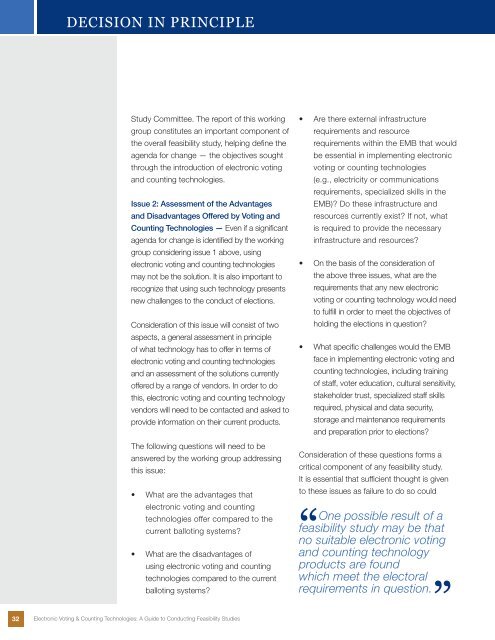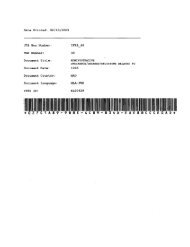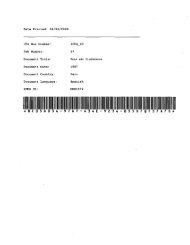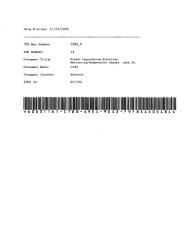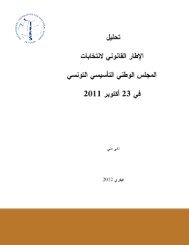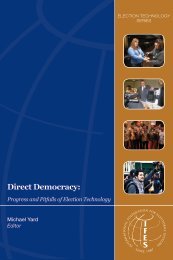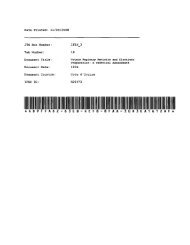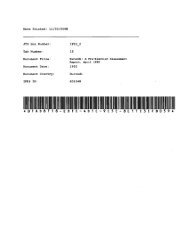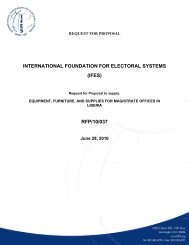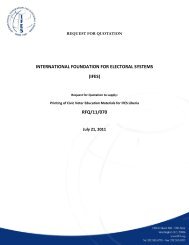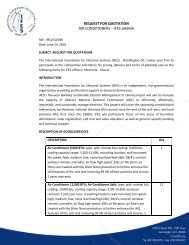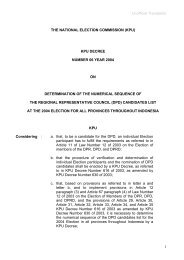Electronic Voting & Counting Technologies - IFES
Electronic Voting & Counting Technologies - IFES
Electronic Voting & Counting Technologies - IFES
- No tags were found...
Create successful ePaper yourself
Turn your PDF publications into a flip-book with our unique Google optimized e-Paper software.
INTERNATIONAL DECISION PRINCIPLEELECTORAL STANDARDS32Study Committee. The report of this workinggroup constitutes an important component ofthe overall feasibility study, helping define theagenda for change — the objectives soughtthrough the introduction of electronic votingand counting technologies.Issue 2: Assessment of the Advantagesand Disadvantages Offered by <strong>Voting</strong> and<strong>Counting</strong> <strong>Technologies</strong> — Even if a significantagenda for change is identified by the workinggroup considering issue 1 above, usingelectronic voting and counting technologiesmay not be the solution. It is also important torecognize that using such technology presentsnew challenges to the conduct of elections.Consideration of this issue will consist of twoaspects, a general assessment in principleof what technology has to offer in terms ofelectronic voting and counting technologiesand an assessment of the solutions currentlyoffered by a range of vendors. In order to dothis, electronic voting and counting technologyvendors will need to be contacted and asked toprovide information on their current products.The following questions will need to beanswered by the working group addressingthis issue:• What are the advantages thatelectronic voting and countingtechnologies offer compared to thecurrent balloting systems?• What are the disadvantages ofusing electronic voting and countingtechnologies compared to the currentballoting systems?<strong>Electronic</strong> <strong>Voting</strong> & <strong>Counting</strong> <strong>Technologies</strong>: A Guide to Conducting Feasibility Studies• Are there external infrastructurerequirements and resourcerequirements within the EMB that wouldbe essential in implementing electronicvoting or counting technologies(e.g., electricity or communicationsrequirements, specialized skills in theEMB)? Do these infrastructure andresources currently exist? If not, whatis required to provide the necessaryinfrastructure and resources?• On the basis of the consideration ofthe above three issues, what are therequirements that any new electronicvoting or counting technology would needto fulfill in order to meet the objectives ofholding the elections in question?• What specific challenges would the EMBface in implementing electronic voting andcounting technologies, including trainingof staff, voter education, cultural sensitivity,stakeholder trust, specialized staff skillsrequired, physical and data security,storage and maintenance requirementsand preparation prior to elections?Consideration of these questions forms acritical component of any feasibility study.It is essential that sufficient thought is givento these issues as failure to do so could“One possible result of afeasibility study may be thatno suitable electronic votingand counting technologyproducts are foundwhich meet the electoralrequirements in question.”


